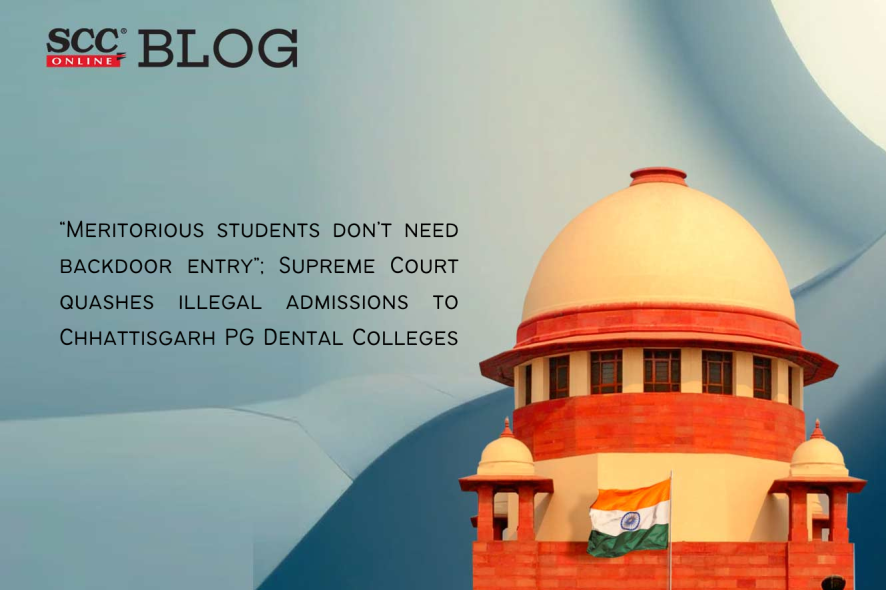Supreme Court: In an appeal filed by the Dental Council of India (‘DCI’) against the order of Chhattisgarh High Court, wherein the Court has quashed and set aside the communication of the State of Chhattisgarh cancelling the admissions of the respondents, the division bench of *M.R Shah and M.M Sundresh, JJ. set aside the said order and reiterated that, even if on the last date of admission, the seats remained vacant, still it was no ground by the institutions to grant admissions unilaterally, and that too without intimating the vacant seats to the Directorate.
The Court noted that as per the procedure and the relevant rules and regulations, namely, Chhattisgarh Dental Medicine Postgraduate Admission Rules, 2017 and the provisions of the Dentists Act, 1948 and Master of Dental Surgery Course Regulations, 2017, the particulars of the seats were required to be intimated to the State Government and Directorate of Medical Education and the admissions were to be given on merits based on the counselling made by the State Government. Further, the admission process was required to be completed on or before 31.05.2018 before 4:30 p.m.
The Court noted that total number of vacant seats for all five colleges were 46 and out of 46, 43 seats were allotted to students in various colleges and out of allotment of 43 seats, 35 candidates joined, and 8 seats remained vacant due to non-joining. Thus, only three seats remained unallotted after mop up round of counselling. Further, the Directorate, on receiving the information of the vacant seats, immediately sent a list of 30 students for filling the three vacant seats according to merit list of the students, to the principal of the dental colleges. However, without intimating the Directorate about the vacant seats, three colleges unilaterally granted admission to the respondents. Thus, the State Government cancelled the admissions given to the respondents, which were illegally given on 31.05.2018 after 4:30 p.m
The Court noted that the respondents were granted admissions by the private colleges in the postgraduate course illegally and their admissions can be said to be backdoor, as the admissions in the said course was required to be made only through counselling by the Directorate. Further, admissions in the colleges were required to be given as per the merit, procedure and regulations, thus, if after the first counselling the seats remained vacant, there shall be second round of counselling and then mop up counselling to fill up the vacant seats. Thus, every time the colleges were required to inform the particulars about the vacant seats to the Directorate, and those vacant seats were required to be filled in on merits by the Directorate through counselling.
The Court observed that in the mop up round of counselling, the respondents did participate, but could not secure admission on merits in the colleges in which subsequently they got admissions through backdoor and, if the respondents were so meritorious, they would have got admissions on merits through mop up round conducted by the Directorate. Thus, this itself suggests that they were not having merit to get admissions in the institutions in which subsequently got admissions. Therefore, the submission that the students were meritorious, and the admission is on merit cannot be accepted. Further, the colleges without any intimation to the Directorate/State unilaterally granted admission to the respondents after the prescribed time, which was not permissible at all.
The Court noted that nothing is on record that any other students were given any opportunity to apply for admissions in the respective colleges for admission on the vacant seats and it was not appreciable how the respondents came to know that at the seats have remained vacant in the colleges, by this the Court inferred that the institutions and the students were in close association and thus, they got admissions illegally.
The Court placed reliance on Astha Goel v. Medical Counselling Committee, 2022 SCC OnLine SC 734 , wherein it was held that “even after some seats remain vacant on the last date of admissions, the date for admissions cannot be extended”, and rejected the submissions of the institutions that the seats remained vacant and therefore the same could have been wasted and therefore admissions were given cannot be accepted.
The Court noted that all the respondents continued their course pursuant to the interim order passed by the High Court and observed that the High Court should not have passed such an interim order directing to grant admissions or continue with course, as the same is not legally sustainable, as once it is found that the respondents were illegally granted admissions, and thereafter to allow them to continue their course shall be perpetuating the illegality; further, nobody can be permitted to take advantage of the order passed by the Courts.
Placing reliance on K.S. Bhoir v. State of Maharashtra, (2001) 10 SCC 264 , Mahatma Gandhi University v. Gis Jose, (2008) 17 SCC 611 , Regional Officer, CBSE v. Sheena Peethambaran, (2003) 7 SCC 719 , the Court has rejected the prayer of the respondents to allow them to complete their course as the undue sympathy would lead to perpetuating the illegality and giving premium to the students who got admissions illegally. Thus, the Court set aside the High Court order and restored the communication issued by the Directorate annulling the admission of the respondents in the postgraduate course.
[Dental Council of India v Sailendra Sharma, Civil Appeal no. 7611 of 2022, decided on 21-10-2022]
*Judgment by: Justice M.R Shah






